The Gentleman
Representing the
United Network Command
for
Law and Enforcement

(Click on the image to zoom in and out.)
... isn't a likely name for a hit television show. Nor was Solo, the original title proposed for the series. That offered too many opportunities for discourteous jibes. So The Man from UNCLE it was.
The Man From UNCLE sprang up from the spy-fiction craze that began with the release of the movie Dr. No. The picture was based on the novel by Ian Fleming and told of the adventures of British Secret Service Agent Number 007.
Dr. No ended up being the sleeper of 1962. Although the critics seemed lukewarm, the box office raked in enough dough that the studio repaid the banks in a few months. The second Bond film, From Russia With Love, was released the next year. It brought in even more money and made Sean Connery a star.
By the beginning of 1964 the spy craze was in full swing, and a third Bond film, Goldfinger, was released. The timing couldn't have been better. The first show of the Man From Uncle - "The Vulcan Affair" - was broadcast on September 22, 1964, just five days after Goldfinger hit the theaters.
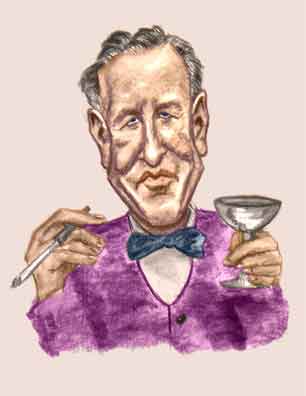
Ian Fleming
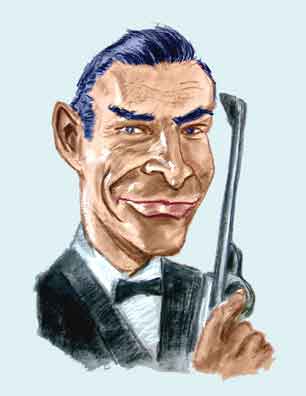
Sean Connnery
007
The Man From Uncle followed the American television standard that you had to have good guys fight bad guys but you didn't want to offend anyone. So the show's premise was there was a vaguely structured international criminal organization that had some ill-defined agenda for controlling the world. It had infiltrated every country from the local to national levels and was wreaking havoc and mayhem on a weekly basis. Their nefarious plans included espionage, sabotage, kidnappings, and even assassinations. But somehow no one ever noticed the organization even existed.
Of course, any secret criminal organization needs a snappy acryonymatic name that everyone can remember. Since a name like SPECTRE was already taken and someone else had dibs on KAOS, the bad guys picked the name THRUSH.
Naturally everyone wanted to know what the letters meant. It was a stretch but eventually a paperback novelist decided they stood for the Technological Hierarchy for the Removal of Undesirables and the Subjugation of Humanity".
Of course, the "good" governments of the world had to get together and create their own organization to thwart the evil plans of THRUSH. Naturally no one should know this organization exists either. And they also needed a acryonymiacal name but one that showed they were good guys. So they decided on The United Network Command for Law and Enforcement which acronyms down to the family friendly name UNCLE.
The two principle agents of UNCLE were an American named Napoleon Solo played by Robert Vaughn and a Russian named Ilya Kuryakin played by David McCallum (who is actually Scottish). The headquarters of UNCLE are in New York City but with branch offices ranging from Singapore to Tulsa. Napoleon and Ilya's boss was the effective but placid Alexander Waverly.
The "front" for UNCLE's headquarters was Del Floria's Tailor Shop (Dry Cleaning and Pressing) in the East 40's. To get into the headquarters proper the agents entered through a fitting room with a false wall. Mr. Del Floria had to push the steam lever of the pressing machine twice to open the door to let the agents in.
THRUSH also needed secure headquarters all over the world that no one knew about. How they tackled this was explained in The Arabian Affair. Since there is no 13th story in buildings, THRUSH just installed their offices in the space between the 12th and 14th floors. So anywhere with tall buildings had a THRUSH office. But you do wonder why no one ever noticed there were people getting on and off the elevator on a floor that didn't exist.
A surprise to students of popular culture is just who first came up with the hero's name. That was none other than the creator of James Bond, Ian Fleming. Norman Felton, who with Sam Rolfe is credited with creating the series, arranged to meet with Ian and discuss the projected series. Ian suggested the hero be dubbed Napoleon Solo, a name suggested by one of the characters in his book Goldfinger.
Originally Norman and Sam wanted Ian as a consultant and were willing to pay him $25,000 per episode. But a combination of reluctance on the part of the producers of the Bond films plus Ian's own poor health led him to drop out of the project.
That one of the biggest hits in television lasted only four seasons is flabbergasting today when comedy shows last nigh on half a century and aren't even funny. Other classic and iconic television programs with surprisingly short runs have been The Wild Wild West (also four seasons), Monty Python's Flying Circus (yes, four seasons), and of course Star Trek (only three).1
Footnote
No matter how popular, British television series tend to be of shorter duration than US productions. It seems the Britons don't think you need to run a series into the ground for success and so they deliberately plan the runs for only a couple of years (East Enders and Coronation Street are notable exceptions). The number of shows per season also tends to be fewer for the series created in the Colonies, maybe only six shows per year. Examples of popular but brief British series are legion: The Thin Blue Line (two seasons), Blackadder (two), Jeeves and Wooster (four), and Upstart Crow (three). Superb!
As for shows that have had decades long runs that should have been dropped after a single season (or episode) are ...
Well, never mind.
What stamped UNCLE apart from other weekly television shows was the complexity of its production. The scenes were generally brief and were supposed to range over the world. You might start in the UNCLE headquarters and then move to exotic locales like the Yukon then to Japan to a monastery in Italy, and to - get this - the Cardiac Indian Reservation in Oklahoma.2 Multiple set-ups per day were needed to keep the action moving as the static three camera set up de rigueur for sit-coms just wouldn't do.
Footnote
Justly criticized as one of the sillier episodes, The Indians Affairs Affair seems unable to avoid any stereotype regarding Native Americans. Although there are tribal lands in the present state of Oklahoma, the residents don't wear Hollywood style "Indian" costumes or substitute motorcycles for horses. Like everyone else, tribal citizens prefer automobiles and pick-ups.
And no, "Cardiac" is not the name of any tribe.
Since the action for a single episode was supposed to be spread out over many cities and countries, there was a need for appropriate sets to serve as the streets of New York, islands in the Mediterranean, the casbah in the Middle East, jungles in the Caribbean Islands, the deserts of Arabia, and an American surburbanite home. Forty sets for an episode weren't unusual, and one show, "The Prince of Darkness Affair", (with a campy Dracula-like character played by Martin Landau) required over eighty separate sets. Fortunately what was available on the sound stages and the back lots of the studio usually sufficed, thank you.
To save time and money, the scenes in television programs and movies aren't filmed in the order as they appear on the screen. Scenes at a single location are shot at the same set-up even if they appear at different points in the plot.3 The personal lives of the actors' also affected the schedule. Because Leo G. Carroll's health wasn't the best, he would have all his scenes filmed at a sitting. Robert Vaughn was studying for his Ph. D. in Communications at the University of Southern California. So his time on the set would be adjusted to allow him to attend classes and give him time for the writing of his thesis, Only Victims: A Study of Show Business Blacklisting.
Footnote
The shooting schedule of some shows was even more compacted. In The Adventures of Superman starring George Reeves, a number of scenes would be filmed in sequence on a single set up even if they were in different shows. For instance most episodes had a scene where Clark Kent, Lois Lane, and Jimmy Olsen would meet with Perry White. So the cast would walk into the set for Perry's office and spend two or three days there shooting the scenes for as many as five separate episodes. Jack Larson, who played Jimmy Olsen said that with multiple shows being shot together and out of sequence, the actors had no idea what was going on. All they knew was when a guy in a blue suit with a red cape showed up, the episode was nearing the end.
This non-sequential shooting modus meant that two sequential scenes in the show might have been shot weeks apart. This sometimes produces what are called continuity errors. In The Wild Wild West one scene was filmed where Artemus Gordon was walking out of the room. But before the next scene was shot Ross Martin suffered a heart attack and didn't return for a couple of months. So Artemus came into the next room he was ten pounds lighter.
Another case of the odd effects of a cut-and-paste shooting schedule was when a movie was being filmed using the sets of another production. So the filming could only be done on weekends. Supposedly a sharp eyed viewer can watch one of the stars - who later became one of Hollywood's most iconic actors - and see his hairline recede.
As indicated in the title of the pilot - Solo - Napoleon was clearly the star, and there were several shows with only minimal Kuryakin. In the first season, there were three episodes where Ilya didn't appear at all. But he became so popular that in the third season David McCallum was upped from "co-starring" status to full-star billing with Robert. Later there were some episodes where Ilya was the main character.
And no, the distinctive hairstyle for Ilya (whose middle name was the non-existent Russian patronym Nickovetch) was not created just for the show. David began sporting his bangs in 1956 and he once pointed out that he did not have a Beatle haircut. It was the Beatles, he said, who had a McCallum haircut.
As unthinkable as it is, the Man From UNCLE almost had no Ilya at all. In the original pilot, the chief of UNCLE was not Alexander Waverly played by Leo G. Carroll. Instead it was Mr. Allison and was played by Will Kuluva.
But after the pilot was completed, Norman Felton got a call from one of NBC's top brass. He couldn't remember the actor's name, the executive said, but he wanted the guy with the "K" name to be replaced with someone older. "You mean Kuluva?" Norm asked. Yes, the executive said, that's the guy.
So Norm began looking for a more senior replacement for the head of UNCLE. Since Will was in his fifties, Norm contacted Leo G. Carroll, a veteran stage actor with cinematic credits and who was now edging into his late seventies. Leo said, sure, he'd take the part.
Later Norman got another call. Wasn't Leo, although a good actor, a bit too old to play the head of a major intelligence organization? Norm scratched his head. But wasn't that what the big bosses wanted?
Upon further discussion, it dawned on Norman that the executive had not meant the actor with the "K" name - Kuluva. Instead it was the actor playing the "K" character - "Kuryakin". That is, the executive had wanted to replace David McCallum with an actor with a less boyish visage. Given that David and Leo's characters were major contributors to the show's success this is an instructive example of how brilliant business decisions are made.
Sometimes Ilya's name gave the actors problems as well. In one of the early shows one of the UNCLE clerical staff mispronounced the name and in "The Very Important Zombie Affair" Captain Ramirez (Rodolfo Acosta) says the name as kur-EYE-yan. Evidently the director simply chose not to re-shoot. The correct pronunciation is, of course, kur-ee-YAH-kin.
Although Leo's role tended to be limited compared to Robert's and David's, the unflappable demeanor and dry wit of Alexander Wavery soon became popular with the viewers, and even in some of the earlier shows he was given an expanded role. His grandchildren also told him they would like to see him do more than just sit behind his desk. So the writers gave Leo extra action in The Five Summit Affair, The Bow-Wow Affair, and The Deep-Six Affair. In the first season's The Deadly Decoy Affair, Mr. Waverly actually deals a THRUSH baddie a karate chop.
The Man From UNCLE went off the air over half a century ago, but it's still popular with the fans although what passed for high technology in the 1960's is now creaky and quaint: room sized "mainframe" computers with flashing lights and reel-to-reel tapes, cord-tethered black dial telephones and public coin fed payphones, and even typewriters. The villains are often drawn from common stereotypes of the era: the evil industrialist, the Fez-wearing middle easterner, the mad scientist, and given the timeframe of the show, there's always the "escaped Nazi" who's trying to keep the ideals of the Reich alive. If someone talks with a non-American accent, he's probably a bad guy.
Yes, although the ladies were usually the episode's "innocent" - an everyday person who somehow gets swept into the adventure - some villains were women. They did, though, tend to be drawn from a less stereotypical evil-person pool than the fellows. Of course, they could still be beautiful blondes, redheads, or brunettes. But in "The Suburbia Affair" the THRUSH villain is a grey-haired middle aged matron played by Reta Shaw - and she was mean! In "The Hula Doll Affair", one of the fully comedic episodes, brothers Peter and Simon Sweet are both THRUSH agents and both are bucking for the promotion to be the head of THRUSH New York. The Sweet brothers are played by Pat Harrington and - get this - Jan Murray with the role of their doting mother filled by Patsy Kelly. Unknown to her sons -SPOILER ALERT! - Mama Sweet is also a THRUSH agent and is actually the head of the board of directors that will decide who gets the promotion.
Not all episodes are created equal and some episodes were created more equal than others. Although today many viewers won't even look at a show in black and white, the first season's programs are ranked among the top. Certainly no one can forget "The Project Strigas Affair" where Werner Klemperer (yes, "Colonel Klink) does a good job playing a bad guy diplomat and his assistant is played by none other than Leonard Nimoy, "Mr. Spock". And the two innocents are Perry Anne Gardner and - yes - William Shatner, "Captain Kirk". Oddly, Bill said he didn't remember meeting Leonard during the filming. Another favorite is "The Never-Never Affair" featuring Barbara Feldon ("Agent 99") as a bespectacled UNCLE translator who wants to become an agent. Here Napoleon's over developed sense of humor almost causes a major security breach, and Cesar Romero stars as the suave urbane THRUSH agent.
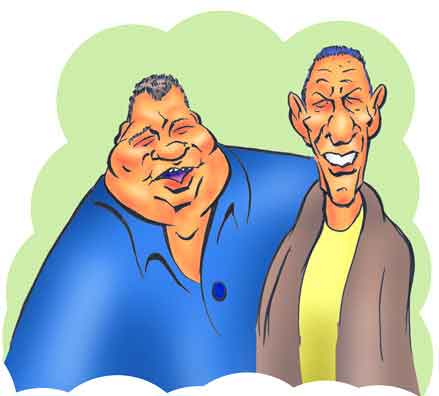
Leonard and Bill
They didn't remember.
Of the later shows in color, one of the best had to be "The Foxes and Hounds Affair" where Vincent Price plays the THRUSH villain Victor Marton - not as suave as Cesar but suave enough. Victor is trying to steal a mind reading machine that the magician-inventor wants to give to UNCLE. Of course, he fails.
Although "The Very Important Zombie Affair" has every voodoo stereotype in evidence, Claude Akins is quite good as an evil Caribbean dictator named El Supremo who has transformed one of his western friendly political opponents into a zombie. "The Dippy Blonde Affair" actually makes you feel sorry for the THRUSH head of station played by Robert Strauss. It seems decidedly strange that the THRUSH engineer Harry Pendleton (Fabrizio Mioni) permits his girlfriend Jojo (the "dippy blonde" played by Joyce Jameson) who knows nothing of THRUSH to freely enter the headquarters and walk around at will. She even attends THRUSH parties where she was noted as "the martini champion." Maybe now we know why THRUSH was never able to conquer the world.
Another of the top shows was "The Minus-X Affair" where UNCLE is working with scientist Dr. Lillian Stemmler (Eve Arden) to make a chemical called "Plus-X" that makes people smarter. But Dr. Stemmler is actually a THRUSH agent and is also working on "Minus-X" which makes people revert back to their childhood. If the guards at important military bases are exposed to Minus-X then THRUSH agents could just walk in and take what they want. There is some doubt about Dr. Stemmler's loyalty to THRUSH but Arthur Rollo, her boss (played by Theodore Marcuse), has kidnapped her estranged and party-girl daughter, Leslie, so that Dr. Stemmler doesn't slack off on the job. Naturally UNCLE prevails and THRUSH is worsted.
Some shows were played mostly for comedy. There was not only the "Hula Doll Affair", but "The Hot Number Affair" features then husband and wife rock duo Sonny Bono and Cher Sarkisian. They work for two New York garment salesmen, played by George Tobias and Ned Glass (both characters are named "Harry"). The bad guy - and he's really bad - is played by long time character actor Joe Mantell (famous for playing Angle who was Ernest Borgnine's best friend in Marty). The "Hot Number Affair" has been panned as one of the worst episodes, but others see it as good fun.
The Man From UNCLE was not the first of the 1960's television spy series. That accolade must go to the British program The Avengers. It starred (among others) Honor Blackman as judo expert Cathy Gale, although her fans also remember her as Hera in Jason and the Argonauts and Miss Galore in Goldfinger. Premiered in 1961, The Avengers was not only pre-UNCLE but pre-James Bond!4
Footnote
The Avengers was a British series filmed on something like a Hollywood schedule. In six years the show averaged 26 episodes a year. Compare this to Upstart Crow with a total of six or seven episodes per year over three years.
For a while it looked like spy shows would displace the Western. Airing soon after The Man From Uncle were I Spy, It Takes a Thief, Secret Agent, Mission Impossible, The Prisoner (filmed in Britain), and the spy spoof Get Smart. But there was always The Wild Wild West for those who wanted to have their spies and cowboys, too.
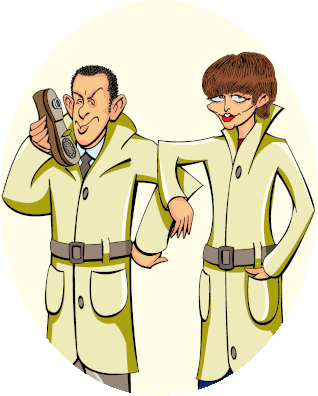
Don and Barbara
Get Smart
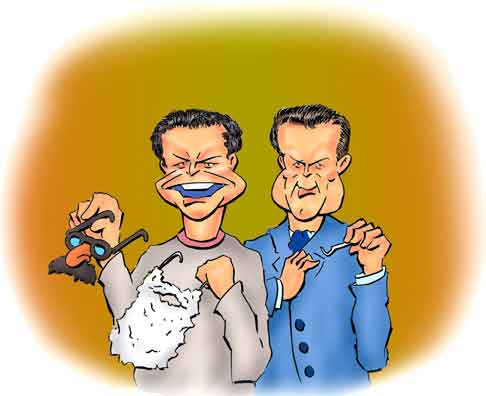
Ross and Bob
The Wild Wild West
And yes, there were Man From UNCLE movies before the more recent post-Millennium incarnation. The first movie was essentially the pilot (in color) with some added scenes. Released as To Trap a Spy, Robert and David played Napoleon and Ilya, but their boss was Mr. Allison as played by Will Kuluva. Instead of THRUSH, UNCLE was battling WASP. A pared down and black and white version - with Leo G. Carroll as Mr. Waverly and THRUSH instead of WASP - became the first show broadcast "The Vulcan Affair".
The seven other movies with Robert, David, and Leo, were put together from other television episodes supplemented with some extra scenes specifically shot for the movie (to add a bit of steam for the paying audience) or scenes borrowed from other episodes. Possibly because the movies were largely the same as the programs that everyone watched on television and for nothing, some were released only in England and not in the United States.
The added scenes also gave extra opportunity for continuity errors. For instance the movie One Spy Too Many was created from the television episode "The Alexander the Greater Affair". Alexander (played by a young Rip Torn) is - what else? - an evil business magnate who wants to take over the world. His chief henchman is Parviz (David Sheiner) and Parviz appears early in the show where he is a typical mustachioed villain with a smoothly shaven pate. But in an added scene filmed just for the movie, he seems to be wearing a bald cap. Also Yvonne Craig - Batgirl on Batman - is slipped into the movie version as Maude Waverly, Mr. Waverly's niece. Her job seems to be mostly hanging around headquarters and teasing Napoleon. Yvonne had a more substantial role in the first season's "The Brain Killer Affair".
The Man From Uncle had one of those notable openings that was a hallmark of 1960's television. THRUSH agents have infiltrated UNCLE headquarters with an assignment to assassinate Mr. Waverly. But one of them encounters an UNCLE agent seen only in front silhouette. The THRUSH agent fires his gun only to have the bullet splinter a clear protective shield. Repeated shots are no more effective. Then lights come up and it's Napoleon!
Naturally from time to time Napoleon and Ilya get captured by THRUSH villains. And rather than soil their own hands with doing away with the UNCLE agent, the villains tie them up with some fiendish contraption that will do them in after a few minutes. Because the THRUSH agents seem to have a squeamish side, they always leave and so give Napoleon and Ilya plenty of time to escape.
This kill-'em-but-let-'em-escape scenario was best exemplified in the two-part episode "The Alexander the Greater Affair". At the end of Part I, Alexander leaves Ilya and Alexander's ex-wife Tracey (Dorothy Provine) tied up and suspended above a deep pit while a candle burns through the rope. Napoleon is strapped onto a table with a slowly descending Edgar Allan Poe type pendulum swinging above him. Of course, Napoleon manages to escape before being cleft in twain and manages to save Ilya and Tracey.5
Footnote
This literary device - placing the heroes in a situation that will do them in but gives them plenty of time to escape - is not a modern invention. It goes back to ancient times. One of the earliest examples is in the story of the founders of Rome, Romulus and Remus.
Romulus and Remus were twins and their mother was Rhea Silvia and their father was the god, Mars. Rhea's father was Numitor, the king of Alba Longa, but he was deposed by his evil brother, Amulius. Because Romulus and Remus are the legitimate heirs to the throne, Amulius decides to do away with them. He does this by putting them in a basket and throwing them in the Tiber River. The basket drifts downstream and the twins are rescued by a she-wolf who takes care of them. Later they are discovered by a simple herdsman, Faustulus, who raises them as his own. Romulus and Remus later reclaim the throne and establish the city of Rome.
The closing of the show became almost as iconic as the opening. The credits were displayed on fast cuts of scenes from the shows with Ilya and Napoleon in action. And each show closed with the notice:
We wish to thank the
United Network Command for Law
and Enforcement, without whose
assistance this program would
not have been possible.
This statement likely suckered in some of the more credulous to believe there really was an UNCLE and a THRUSH, much as the "disclaimer" from the movie The Andromeda Strain had some believing the action of the movie really happened. In the movie there was a splash card that was displayed on the screen:
This film contains the four day history of a major American scientific crisis. We received the help of many generous people attached to Project Scoop at Vandenberg Air Force Base and the Wildfire Laboratory in Flatrock, Nevada. They encourage us to tell the story accurately and in detail. The documents presented here are soon to be made public. They do not in any way jeopardize national security.
Although this statement was included - as stated on a popular informational website - to "enhance" the story, some people swallowed it. But The Andromeda Strain was pure fiction.
So may have it been with The Man From UNCLE. But if UNCLE's viewers were careful to look at the fine print below the - quote - "acknowledgements" - unquote - they would also have read:
The events, characters, and firms depicted in this photoplay
are fictitious. Any similarity to actual persons, living or
dead, or to actual firms, is purely coincidental.
That's any events, characters, and FIRMS are fictitious. That includes Napoleon, Ilya, Del Floria's, THRUSH, and yes, UNCLE.
That there could be people who think that an acknowledgement is true, even when it's immediately followed by a disclaimer stating that it's fiction, is enough, well, it's enough to make you say
U. N. C. L. E.
References and Further Reading
The Man from U.N.C.L.E. Book: The Behind-the-Scenes Story of a Television Classic, Jon Heitland (author), Robert Vaughn (introduction), Titan Books, 1987.
The Dagger Affair, David McDaniel, Ace Books, 1965.
"Man From Uncle Episode Guide", William Koenig, UNCLE: The Show.
Superman: Serial to Cereal, Gary Grossman, Popular Library, 1977.